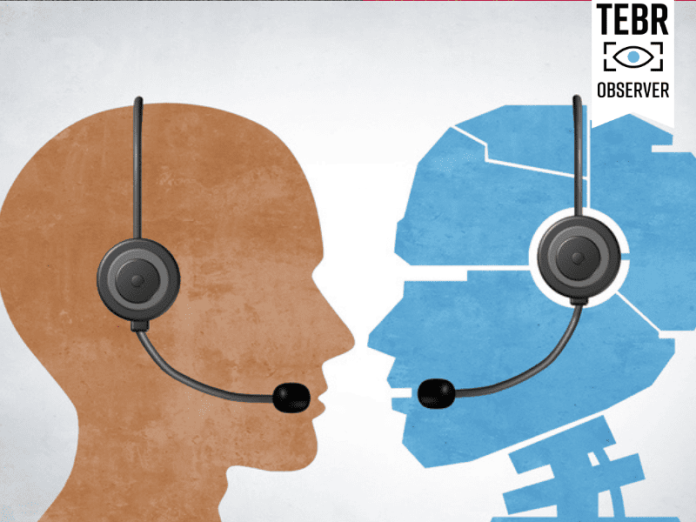By Marcelina Horrillo Husillos, Journalist and Correspondent at The European Business Review
The Philippine Business Process Outsourcing (BPO) industry employs about 1.7 million people and generated nearly US$38 billion in revenue in 2024. It contributes 8.5% to the country’s GDP, representing one of the most reliable drivers of national progress. These figures do not include freelancers who provide services via platforms like Freelancer.com, Remotasks, UpWork, and Fiverr – up to 1.5 million Filipinos are registered on international online platforms for freelancing services.
Yet the growing use of artificial intelligence (AI) technologies is rapidly transforming employment in this dynamic industry. Many BPO workers are at risk of job loss as AI increasingly automates customer support tasks, including individuals who perform voice-based services and write social media and market content.
AI tools can now engage with customers worldwide without language barriers, thus diminishing companies’ plans for outsourcing their services to any single country. That will be especially the case if businesses in higher-income countries choose to invest in AI solutions instead of continuing to outsource services to humans abroad.
Business process outsourcing (BPO) has been one of the most dynamic sectors of the Philippine economy over the past 25 years – 1.82 million Filipinos employed nationwide, with the sector outpacing the global outsourcing average of 3.5% by achieving 7% growth in 2024 -. By tapping into a large pool of English-speaking college graduates and having an affinity with the United States and its culture, the Philippines has become a leading beneficiary of international subcontracting of certain business functions to overseas vendors.
Today, US firms and companies around the world rely on Philippines-based workers to perform voice and non-voice services such as data entry and analysis, customer service, document transcription, IT support, fulfilment of e-commerce orders, software development, sales and marketing, game development, payment processing, accounting, and other tasks, including creative services and design. Among the sectors that outsource activities to the Philippine BPO industry are IT, health care, legal, and finance. Hundreds of BPO companies operate in Metro Manila, Cebu City, and other Philippine urban centres like Clark, Davao, and Iloilo
However, rapidly emerging AI-driven technologies, including virtual assistants, chatbots, and automated customer service platforms, have begun to take over tasks previously handled by humans, especially for routine customer inquiries and screening and directing customers’ calls. Indeed, the rapid adoption of chatbots to answer common questions threatens to suppress demand for entry-level customer service representatives. New technologies are being quickly adopted to improve efficiency, consistency, and quality while simultaneously lowering costs. Even companies that prioritize a human touch are forced to use the tech to satisfy clients who are demanding greater automation.
Transforming Jobs
It estimates that the number of BPO industry jobs in the country will actually increase by 1.1 million between the end of 2023 and 2028. While AI has been displacing workers in the Philippines and in other countries — it has also created new employment opportunities. People continue to be needed to perform tasks like classifying content, coding, data editing, strategy and annotating.
As routine tasks are automated, the need for advanced technical skills — such as programming, managing, and maintaining AI systems — is growing. The Philippines’ BPO industry has historically prioritized a workforce with strong communication abilities over technical expertise. However, the transition to AI demands workers skilled in data analytics, machine learning, and AI system management.
For instance, BPO firms can use machine learning algorithms to automate many of their repetitive tasks to free up human workers to do higher-value operations. They can also leverage AI to produce insights and accurate data analyses.
BPO companies can also use AI to improve processes already there, and accurately predict customer needs and trends, giving business leaders the opportunity to make well-informed decisions. These insights also allow companies to improve their recruitment and training strategies.
Individuals are also being employed to differentiate objects and living beings in videos that are used to formulate the algorithms for autonomous driving and to label images so that AI can, for example, generate representations of public figures. Technological solutions are not infallible, and many require — or at least benefit from — human involvement. For example, AI can be used to analyze large amounts of data quickly, providing initial insights that help BPO workers resolve complex customer issues more efficiently.
Need for Policy
For the industry to comprehensively adapt to the coming wave of AI innovation, government and industry leaders need to co-operate to develop policies and practices that boost investment in AI education and training. Such collaboration is also important for nurturing opportunities that arise through a human-AI hybrid approach, which could help mitigate the negative impacts of AI on employment.
The CCAP, a non-profit organisation consisting of more than a hundred local BPO firms, has been a strong supporter of AI integration in the Philippines. The group recently reiterated its stance that generative AI can benefit not only contact centres but other IT-BPM companies as well.
Since 86% of Filipino white-collar workers already use AI to “boost productivity, efficiency and creativity,” according to the 2024 Work Trend Index created by LinkedIn and Microsoft; advanced language, emotional recognition, and generative AI tools have made work more demanding for BPO workers, and outsourcing clients are requiring more automation and AI integration in workflows, the chances for AI technology to become a contribution to the BPO force rather that a constrain are greater than ever.
Conclusion
AI represents both a challenge and an opportunity for the Philippine BPO industry. The automation of routine tasks, cost-efficiency of AI, and changing skill demands pose significant risks to the industry and those employed within it. However, by investing in upskilling, embracing AI as a complementary tool, and adopting policies that foster innovation, the industry can adapt and continue to thrive in the future.
AI technologies allow agents to concentrate on more important tasks such as completing complex transactions. This would result in better productivity, as well as a much more positive experience for both workers and customers.
Yet policies that encourage investment in AI education and training could help mitigate the negative impacts of automation. Additionally, fostering partnerships between educational institutions, private companies, and the government to develop AI-related curricula could help equip the workforce with the necessary skills to thrive in the evolving job market.
The key lies in being proactive, adaptable, and forward-thinking, ensuring that the Philippines remains a global leader in outsourcing services in an AI-driven world. Thinking more ambitiously, there is even potential for the Philippines to position itself as a hub for AI services, providing expertise in AI management, data annotation, and machine learning model training.





































